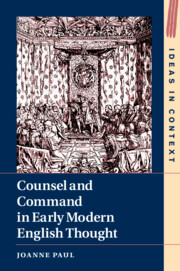Book contents
- Counsel and Command in Early Modern English Thought
- Ideas in Context
- Counsel and Command in Early Modern English Thought
- Copyright page
- Contents
- Acknowledgements
- Introduction
- Part I
- Chapter 1 The Humanist Counsellor
- Chapter 2 The Right-Timing of Counsel
- Part II
- Part III
- Bibliography
- Index
- Ideas in Context
Chapter 1 - The Humanist Counsellor
from Part I
Published online by Cambridge University Press: 18 February 2020
- Counsel and Command in Early Modern English Thought
- Ideas in Context
- Counsel and Command in Early Modern English Thought
- Copyright page
- Contents
- Acknowledgements
- Introduction
- Part I
- Chapter 1 The Humanist Counsellor
- Chapter 2 The Right-Timing of Counsel
- Part II
- Part III
- Bibliography
- Index
- Ideas in Context
Summary
It was consistent with both humanism and the growth of political bureaucracy that humanisticallyeducated ‘new men’ took roles as counsellors in the courts of both early Tudor kings. This chapter explores the role of the counsellor in the work of three leading Renaissance humanists: Erasmus, More and Castiglione. Each accepted that good counsel should, to varying degrees, rule the prince. At the heart of their writings remains, however, a question about the efficacy of counsel in a hereditary monarchy. Often overlooked in this debate is importance of Seneca, who provides the basis for the discussion of the effectiveness of counsel in all three writers’ works, contrasting principles learned through instruction from precepts gathered through counsel.
- Type
- Chapter
- Information
- Counsel and Command in Early Modern English Thought , pp. 15 - 40Publisher: Cambridge University PressPrint publication year: 2020

